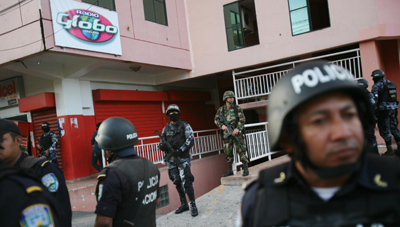
CPJ Impact
News from the Committee to Protect Journalists, August 2010 Honduras report citing official failures draws a responseIn a few short months, seven journalists were gunned down in Honduras. While the country has been beset by crime and political turmoil, it had not been known as a particularly dangerous place for the press. Is someone targeting…
China sets prison terms for 3 Uighur Web managers
New York, August 2, 2010—Three Uighur-language website managers were sentenced Friday to prison terms of three to 10 years after being found guilty under broad charges of “endangering state security.” The men had been jailed after ethnic rioting in July 2009 in Urumqi, capital of the far-western, predominantly Muslim, Xinjiang Uighur Autonomous Region.
China sentences Uighur journalist to 15 years
New York, July 26, 2010—The 15-year jail sentence imposed by a Chinese court on Uighur journalist and website manager Gheyrat Niyaz is unjustly harsh and should be overturned immediately, the Committee to Protect Journalists said today. The fact that Niyaz was convicted under sweeping “endangering state security” charges is an indicator of how far the government will go…

Foreign Correspondents’ Club of China site under attack
New York, April 2, 2010—The denial of service attack on the Foreign Correspondents’ Club of China (FCCC) Web site is contributing to an atmosphere in which journalists feel their communication is not secure and their reporting is under threat, the Committee to Protect Journalists said today.

Journalists report Yahoo e-mail accounts hacked in China
New York, March 31, 2010—News reports that the Yahoo e-mail accounts of reporters and others in China and Taiwan have been compromised are a reminder that journalists must be vigilant when communicating over the Internet, the Committee to Protect Journalists said today. CPJ called on Internet companies to reassess their business practices in countries where…
Attacks on the Press 2009: China
Top Developments• More access for foreign reporters, tighter rules for local assistants.• As online use grows, government censors sites, jails critics. Key Statistic 24: Journalists jailed as of December 1, 2009. While China’s ruling communist party celebrated 60 years in power in 2009, its critics commemorated antigovernment movements in Tibet in 1949 and Tiananmen Square…
Attacks on the Press 2009: Zimbabwe
Top Developments• Government fails to implement reforms allowing private media to operate.• Two international broadcasters allowed to resume operation. Key Statistic $32,000: Application and accreditation fees imposed on international journalists. In a measure of the deplorable state of press freedom in Zimbabwe, a year marked by harassment and obstruction was considered a small step forward. “Journalists…
Rebecca MacKinnon, Ahmed Rashid, and María Teresa Ronderos join CPJ board
New York, December 21, 2009—The Committee to Protect Journalists announced the addition of three leading journalists to its board of directors today: Rebecca MacKinnon of Global Voices, Ahmed Rashid, journalist and scholar, and María Teresa Ronderos of Semana.com.
Shakeup at China’s leading investigative magazine
You wouldn’t have heard it from her, but Hu Shuli resigned from her post as editor of Caijing magazine on Monday. The battle over political coverage and finances at Caijing (cai is “finance” and jing is “economics”) had been reported for about three months, but the missing component in the coverage was Hu herself—she has…
National Day triggers censorship, cyber attacks in China
New York, September 22, 2009—The Chinese government should stop censoring Web sites and protect Internet users from cyber attacks in advance of upcoming National Day celebrations, the Committee to Protect Journalists said today. October 1 marks the 60th anniversary of the founding of the People’s Republic.